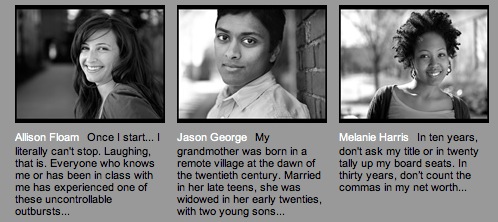In dealing with MBA admissions clients, I’m always looking for ways to push them beyond the ordinary, both in terms of how they frame their life to date and what they plan to do in the future. I also counsel applicants to ‘think like a CEO-in-waiting,’ that is, ask: what would a senior executive do here? What would she say? How would he apply?
The poster child for the pathbreaking senior executive is business legend Steve Jobs, Apple CEO. I recently came across a site called MBA Naukri that has collected Job-isms, some of which I have reproduced here as guidance in ‘reaching for more’ in an MBA application.
1. There is no shortcut to excellence. “Use your talents, abilities, and skills in the best way possible and get ahead of others by giving that little extra. Live by a higher standard and pay attention to the details that really do make the difference. Excellence is not difficult – simply decide right now to give it your best shot – and you will be amazed with what life gives you back.”
2. The only way to do great work is to love what you do. “If you haven’t found it yet, keep looking. Don’t settle. As with all matters of the heart, you’ll know when you find it. I’ve got it down to four words: ‘Do what you love.’ Seek out an occupation that gives you a sense of meaning, direction and satisfaction in life. Having a sense of purpose and striving towards goals gives life meaning, direction and satisfaction. It not only contributes to health and longevity, but also makes you feel better in difficult times.”
3. Create something to give back. “You know, we don’t grow most of the food we eat. We wear clothes other people make. We speak a language that other people developed. We use a mathematics that other people evolved… I mean, we’re constantly taking things. It’s a wonderful, ecstatic feeling to create something that puts it back in the pool of human experience and knowledge.”
4. Fail and rebound. “I’m the only person I know that’s lost a quarter of a billion dollars in one year… It’s very character-building.Don’t equate making mistakes with being a mistake. There is no such thing as a successful person who has not failed or made mistakes, there are successful people who made mistakes and changed their lives or performance in response to them, and so got it right the next time. They viewed mistakes as warnings rather than signs of hopeless inadequacy. Never making a mistake means never living life to the full.”
5. Dent the universe. “We’re here to put a dent in the universe. Otherwise why else even be here? Did you know that you have big things to accomplish in life? … Don’t be trapped by dogma, which is living with the results of other people’s thinking. Don’t let the noise of other’s opinions drown out your own inner voice. And most important, have the courage to follow your heart and intuition. They somehow already know what you truly want to become. Everything else is secondary.”
Granted, it’s much easier to say stuff like this if you’re a billionaire celebrity not a cubicle slave. But you can see that if Jobs himself were applying for an MBA he would not be saying something nebulous like: ‘upon graduation I plan to go into management consulting and then transition to be a manager in the IT sector.’ He’d tell you exactly how he was going to dent the universe, why that was a worthwhile and necessary thing to do, and why it was his deepest inner purpose to do it.

